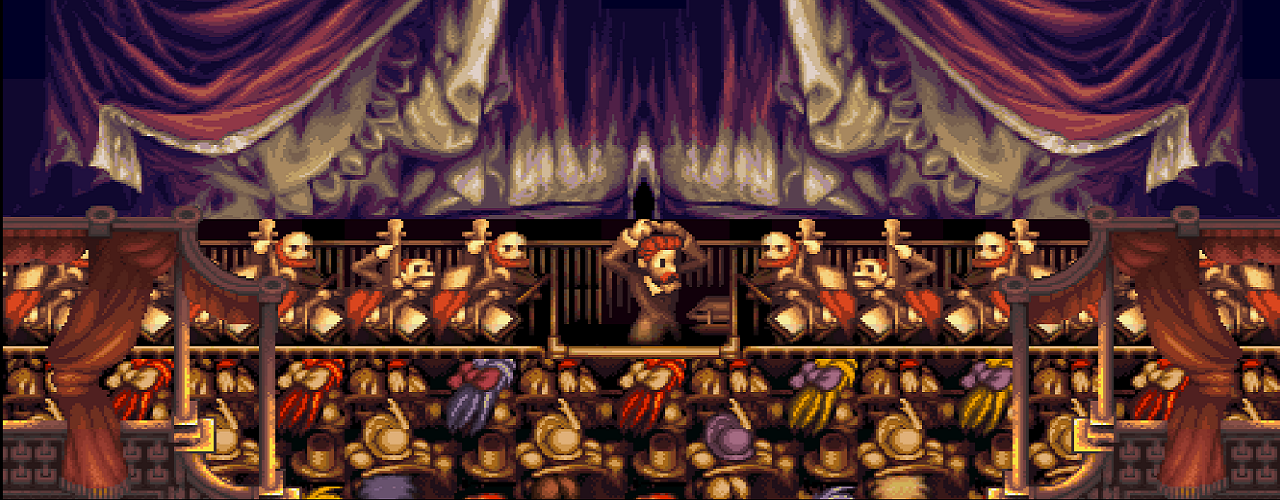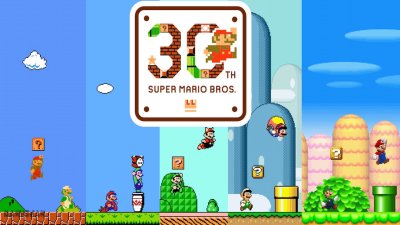Way back in 1994. at the end of the life cycle of the Super Nintendo Entertainment System, Squaresoft released what is now considered to be one of the greatest games ever made: Final Fantasy VI. I didn’t realize it at the time; but when I was finally able to get my hands on the game I may have been too young to fully appreciate how momentous Final Fantasy VI was - and still is - to this day.
Many games back then only had plots as an afterthought, and while the sprites and pixelated art of the day continues to be beautiful, it lacked the ability to show human emotions and expressions on the characters. Developers were forced to work around these limitations, and when your hands are tied you have to come up with some creative ways to accomplish what you want. Nowhere is this more evident than in Final Fantasy VI, which is the perfect combination of developer ingenuity, musical creativity, and a willingness to deliver a mature and fleshed-out story.
I never owned a Super Nintendo - as my family was more of a Sega Genesis family - and to this day, it’s one of the biggest regrets in my gaming life. However, I was fortunate to have experienced most, if not all, of the best games of the generation through my best friend and his Super Nintendo. On weekends I would either go to his house or he would come to mine and we would spend the next two days devouring whichever game he had at the time.
Nintendo Power was still a thing back then and while we took turns alternating between who played the games, the other person would read through the backlog of magazines that my friend had built up. It was through these magazines I stumbled upon Final Fantasy VI, and Nintendo Power had done a full feature issue on the game, with large maps and a walkthrough. Final Fantasy VI promised to be larger than any game at the time, at around 30 or 40 hours to finish - depending on your level of dedication to eke out all of its secrets. I begged my friend to buy it.
Eventually he picked up a copy, and by the time I came over to his house that weekend he had already powered through much of the game. He was completely floored and couldn’t stop talking about how great the music, visuals and story were, how it was unlike anything he had ever played before, surpassing all of his expectations. He was right, I’m still amazed by how much emotion and drama was packed into a game that is now 20 years old.
All of Final Fantasy VI’s amazing feats can be encapsulated in its most iconic scene, the Opera House. This scene is the wonderful example of the ingenuity of the game’s programers - overcoming the limitations of the Super Nintendo’s sound chip to create a genre defining moment that still resonates today. I still get chills when I hear the musical score from the Opera House, and its Shakespearean story of Maria and Draco is as memorable today as it was back then. I had no idea what to expect when my party arrived at the Opera House and frantic Impresario, the show’s director, was missing his lead role of Maria. He quickly saw found what he was looking for in Celes, and pressed her into the role to help save the show from catastrophe, the show must go on as they say.
The incomparable Celes dons the role of Maria, love of the honorable knight Draco of the West, who was presumed killed in a war with the East. In the name of peace, Maria is forced to marry to the Prince of the East, and Celes must quickly learn her lines before she is thrust on stage.
As Maria, Celes ascends to the top of the castle I had to recite her lines perfectly or the rancorous crowd would boo her off stage and require you to start again. Maria is heart-broken by the loss of her love and the current state of the world of the world, now out of her control and shattered around her. This whole sequence is an amazing use of foreshadowing for Celes’ own story, as it seems that Maria might take her life. Finally at the end of her climb, she accepts the loss of her love and her fate - mirrored later in the game by Celes’ own choice to attempt suicide after the loss of her loved ones and the destruction of the world by the jovial villain Kefka.
All of the music was written and composed by the legendary Nobuo Uematsu, arguably one of the best modern composers in the medium. Uematsu has gained global recognition for his music in games and he considers his work on Final Fantasy VI to be some of his best work; it’s no surprise that the soundtrack has gained worldwide acclaim.
The limited midi player of the Super Nintendo was unable to incorporate vocals at the time, but fortunately this lack of capabilities helped to make the scene even more memorable. Uematsu was forced to use synthesizers to harmonize lyric-like sounds with musical accompaniment, which is also synched up with the character movement and mouth. When the words are displayed in text on the screen your mind fills in the gaps, and you can hear each of the actors singing.
The whole scene unfolds with one of the most memorable songs I’ve ever heard in a game playing in the background, and the whole section becomes a wonderful dance of cadence and rhythm. The large band in the pit can be seen just below center stage, and while they are only able to have basic animation, they are all moving in tune with the music. This helps build into the aesthetic of the whole scene as the room feels wide and vaulted, large enough to seat a large and vocal audience.
Like many games late into a console generation, Final Fantasy VI took full advantage of years of experience developing for the SNES to heart, creating a game that is still with me today. Perhaps it is why I love and crave large, detailed RPGs over most other genres; I’m still looking for something to stand up next to what I consider to be the best RPG ever made. I didn’t know it at the time, but the Opera Scene was a defining moment that changed things - not just for me, but everyone in the gaming world.
It was the start of changing the way that people perceived games: not just as fun toys, but as interactive stories and novels, with fleshed-out and developed characters that really make you about what happens to them and where they ultimately end up. Without Final Fantasy VI we may not have had the Aerith death scene from VII, and we could be years behind where we are now in developers attempting to tell stories with a mature subject matter.
Final Fantasy VI was also the first game that changed what I expected from the games I played - layered stories with multiple perspectives and mature themes, and a rich narrative. Stories in games have come a long way since 1994; I wonder where we would be now, if Final Fantasy VI had never been released. I look at how far Square has come in twenty years, and I worry that the next Final Fantasy may be my last attempt to give this franchise credit. For me at least, nothing has ever come close to the series’ swansong on Nintendo’s 16-bit console.


